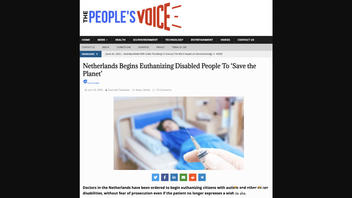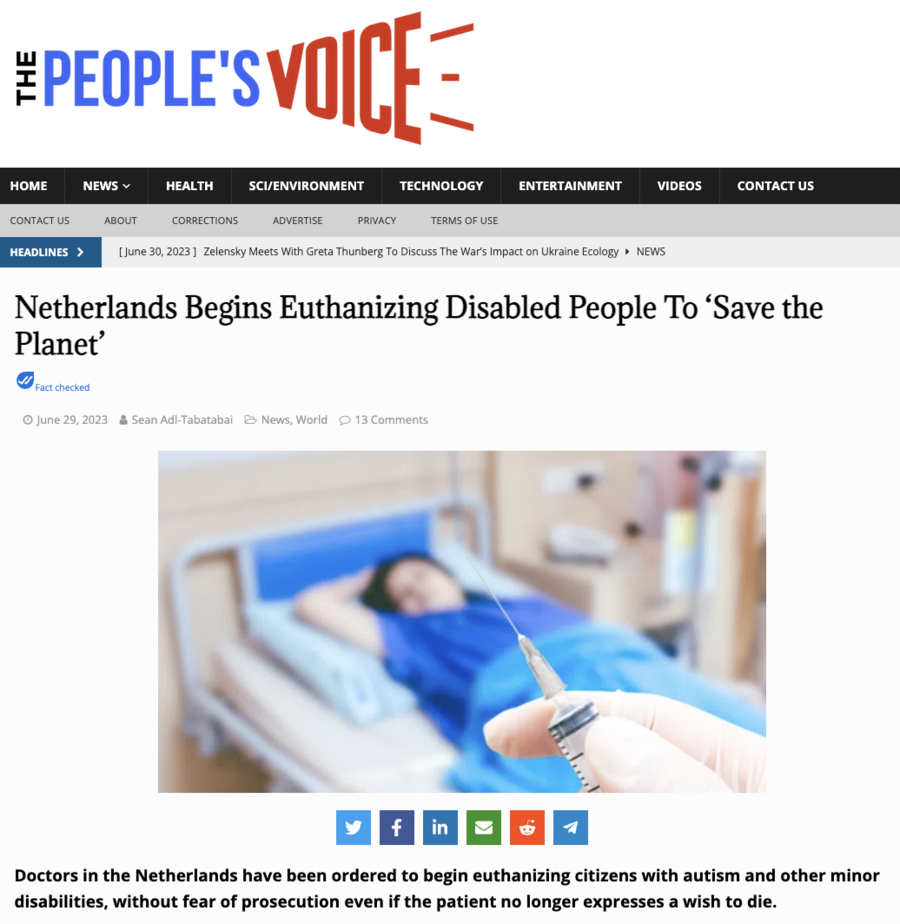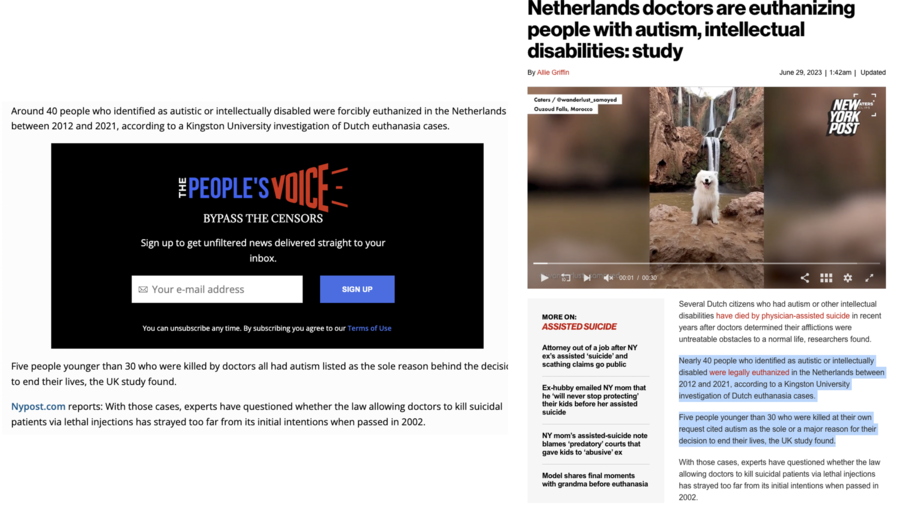
Did Dutch physicians start to euthanize people with autism and "other minor disabilities" against their patients' will in order "to save the planet"? No, that's not true: The source of the claim distorted the findings of a recent study that concluded that, in some cases, people requesting assisted death do not cite physical suffering. The results did not imply that Dutch physicians en masse violate the core principle -- consent -- that guides the procedure under Dutch law.
The story originated from an article (archived here) by The People's Voice on June 29, 2023, under the title:
Netherlands Begins Euthanizing Disabled People To 'Save the Planet'
The article opened:
Doctors in the Netherlands have been ordered to begin euthanizing citizens with autism and other minor disabilities, without fear of prosecution even if the patient no longer expresses a wish to die.
This is what it looked like at the time of the writing of this fact check:
(Source: The People's Voice screenshot taken on Fri Jun 30 13:33:05 2023 UTC)
The People's Voice article largely relied on text from a June 29, 2023, New York Post article about the Dutch euthanization of autistic and disabled patients; two similar paragraphs can be seen in the screenshots below (click to expand). However, unlike The People's Voice's own allegation, The New York Post did not report that the Dutch government had ordered physicians to euthanize these patients to "save the planet."
(Sources: The People's Voice screenshot taken on Fri Jun 30 17:21:22 2023 UTC; The New York Post screenshot taken on Fri Jun 30 17:23:00 2023 UTC; composite image by Lead Stories)
Contrary to The People's Voice claim, nothing in publicly available records indicates that people in the Netherlands were killed against their will or that the government "ordered" attending physicians to euthanize them. Nor has any major media organization reported that Dutch physicians acted against their patients' wishes or violated any existing rules.
The Dutch government explicitly says that no assisted-dying procedures can be carried out if a person does not want that:
Euthanasia ... is performed only when the patient has clearly expressed the wish to die.
The absence of such a wish makes it a matter of criminal investigation in the Netherlands:
Euthanasia and assisted suicide are legal only if the criteria laid down in the Dutch Termination of Life on Request and Assisted Suicide (Review Procedures) Act are fully observed. Only then is the physician concerned immune from criminal prosecution.
Moreover, cases of euthanasia are reviewed by at least three experts who oversee how it is implemented:
Doctors have a duty to report all unnatural deaths to the municipal pathologist. In cases of euthanasia, the latter then notifies a regional review committee. Such committees comprise, at the minimum, a medical doctor, an ethicist and a legal expert. The committee assesses whether the physician who performed the euthanasia has fulfilled the statutory due care criteria. The review committee procedure is intended to ensure greater transparency and consistency in the way cases are reported and assessed.
One of the most recent case descriptions, published in May 2023 on the Dutch government portal, concerned a female patient between 20 and 30 years old. She "suffered hopelessly and unbearably as a result of multiple psychological disorders" (as translated by Google Chrome) and, in addition, "possibly ... suffered from an autism spectrum disorder" (as translated by Google Chrome).
The case file evaluated the actions of the physician who performed euthanasia and emphasized that the doctor consulted with several psychiatrists after psychotherapy and that other treatments didn't work. The patient, who was capable of decision-making, repeatedly expressed her wish to die and requested euthanasia, according to these findings.
After studying the patient's medical history, the overseeing body decided:
The committee came to the conclusion that the physician acted in accordance with the due care criteria.
The People's Voice story about supposed abuses of Dutch euthanasia procedures went live a day after established news media (for example, the Associated Press) reported on a new British study, published in May 2023 in the peer-reviewed British Journal of Psychiatry (BJPsych). Researchers looked into 927 cases of people requesting euthanasia between 2012 and 2021; the cases come from a Dutch government database of euthanasia cases published since 2012. Of the cases cited in the study, 39 people were "autistic and/or intellectually disabled," the study found. Slightly less than half of them were younger than 50.
While researchers brought up an important question of how to look at moral and mental suffering within the existing legal framework for euthanasia, the study's sample size is still small compared to the 59,996 euthanasia procedures completed during the same period in the Netherlands.
The paper's main conclusion was that some people requesting euthanasia exclusively cite the kind of suffering not caused by physical pain:
Factors directly associated with intellectual disability and/or ASD were the sole cause of suffering described in 21% of cases and a major contributing factor in a further 42% of cases. Reasons for the EAS request included social isolation and loneliness (77%), lack of resilience or coping strategies (56%), lack of flexibility (rigid thinking or difficulty adapting to change) (44%) and oversensitivity to stimuli (26%). In one-third of cases, physicians noted there was 'no prospect of improvement' as ASD and intellectual disability are not treatable.
The People's Voice did not provide information about these findings in its article.
The People's Voice has a long history of publishing false stories. It describes itself as a resource "comprised of various web pages operated by Fact Checked Limited."
As of this writing, its website contained a liability disclaimer that says:
FACT CHECKED LIMITED AND/OR ITS SUPPLIERS MAKE NO REPRESENTATIONS ABOUT THE SUITABILITY, RELIABILITY, AVAILABILITY, TIMELINESS, AND ACCURACY OF THE INFORMATION, SOFTWARE, PRODUCTS, SERVICES AND RELATED GRAPHICS CONTAINED ON THE SITE FOR ANY PURPOSE. TO THE MAXIMUM EXTENT PERMITTED BY APPLICABLE LAW, ALL SUCH INFORMATION, SOFTWARE, PRODUCTS, SERVICES AND RELATED GRAPHICS ARE PROVIDED 'AS IS' WITHOUT WARRANTY OR CONDITION OF ANY KIND.
Other Lead Stories fact checks about euthanasia can be found here.



















